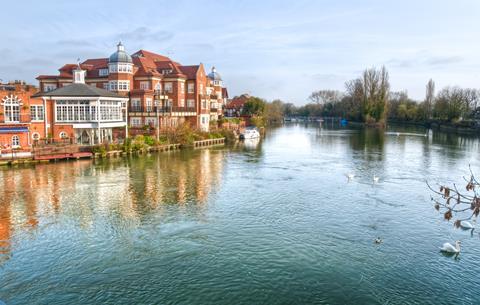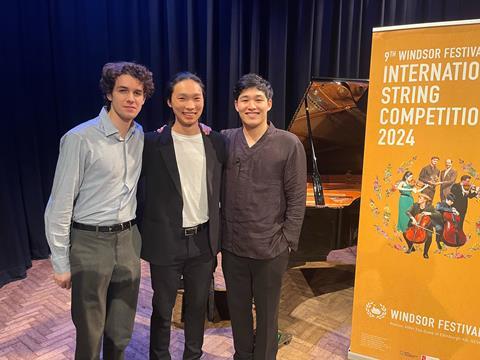Charlotte Gardner reports from the first in-person Windsor Festival International String Competition to take place since 2019, and discovers that the talented competitors still have everything to play for

Discover more Featured Stories like this in The Strad Playing Hub.
Read more premium content for subscribers here
The biennial Windsor Festival International String Competition (WFISC) may be small in size and comparatively new, but owing to both its track record in singling out artists who appear set for significant performance careers, and its career-changing first-prize package, the 2024 edition felt in advance like one of the year’s most important competition diary dates, not least as this was its first live edition since 2019.
This ninth edition was, as ever, open simultaneously to violinists, violists and cellists aged 16–26. Equally, as ever, the prize was not so much about monetary value (a comparatively modest £5,000, £2,000 and £1,000 respectively to the three finalists) or any in-competition opportunity to play with an orchestra
(all the rounds are piano-accompanied recitals). Instead, concerto engagements are the focus of the first-prize package, which for 2024 was significantly expanded thanks to two new associate orchestras: the Royal Philharmonic, with whom the winner now not only gets the usual concerto gig in Windsor Castle’s Waterloo Chamber during the Windsor Festival in September, but also a UK tour; and the Orpheus Sinfonia, offering a London concerto performance. There is also the customary solo recital recording with Champs Hill Records, plus solo recital engagements, including one at composer William Walton’s home on the island of Ischia.
So the WFISC remains a competition where the winner takes all, though also one where no one loses out financially for having entered, and everyone gains experientially. All twelve semi-finalists had their travel arranged and paid for by the competition itself – something the cellists in particular spoke of with appreciation. Once in Windsor, they lodged with host families which provided home-from-home support for the duration (9–16 March). Those who didn’t progress to the finals nevertheless met with the judges for feedback and had the chance to support local young string players through a workshop and performance of Elgar’s Serenade for Strings. On finals night at Eton College School Hall, they had the chance to meet the Duke of Edinburgh, alongside the finalists, before being invited to attend the post-finals party and to socialise more informally with the judges. As Windsor Festival director Martin Denny told me, ‘Who knows what may happen as a result of those conversations.’
The judges were violinist Joji Hattori, violist Lars Anders Tomter and cellist Hannah Roberts for the semi-finals (12 and 13 March); Natalie Clein replaced Roberts for the finals (15 March), when the core jury of three was augmented by Denny himself, RPO managing director James Williams, and Champs Hill Records executive producer Alexander Van Ingen.
One of the distinguishing elements of WFISC is its absence of set works, the only compulsory repertoire requirements for the semi-finals being two contrasting movements of a Bach sonata or partita, and any piece written in or after 1975. The final piano-accompanied recital was then an entirely free choice. And while it’s unusual for a major competition to make concerto performance the prize rather than part of the selection process, to some extent this aided the jury in finding that true, compelling young voice. As Tomter said to me, ‘Most string players can be most true to themselves by not having to project through a symphony orchestra. Concerto performance is a very unbalanced view of what string playing is about. These days, interesting musicians do a lot of chamber music and some concerto playing.’
Interest was certainly the operative word across the rounds. From the semi-finalists – five violinists, one violist and five cellists, chosen from 159 applicants hailing from 40 countries – came eleven entirely contrasting programmes whose musical quality often felt well beyond the competition norm. The competitors also spanned the age spectrum, from 16-year-old Chinese violinist Julia Wang (a natural musician who swiftly won the room over) to three 26-year-olds – which would have been four, had Korean violinist Anna Im not had to withdraw owing to injury.

Another sadness was 20-year-old American violinist Yesong Sophie Lee being forced to withdraw at 72 hours’ notice, having been refused permission to attend by Philadelphia’s Curtis Institute, where she studies. The Windsor Festival appealed, but to no avail, so taking her place at the eleventh hour was 24-year-old Dutch violinist Leon Blekh, who ended up taking second prize. A real old-style virtuoso with a tremendous Russian-school sound, he combined ear-popping technique with huge musicality in Ernst’s The Last Rose of Summer, before displaying rich-toned power and romance in Strauss’s Violin Sonata. He brought the Strauss to the final too, performing it with equal aplomb, while doubling down on the virtuoso image by way of Tchaikovsky’s technically formidable Valse-Scherzo – a brilliantly executed, crowd-pleasing pairing that secured him the audience prize as well.
The other two finalists were cellists, and their placing felt inevitable from the moment they played their first semi-final notes. First we heard 25-year-old American-Canadian cellist Leland Ko in a notably cohesive, personality-rich, highly communicative programme. He was the only finalist to include concerto music in his semi-final programme; and the first two movements of Walton’s Cello Concerto were a canny choice, translating effortlessly into the chamber domain. He also got creative with Bach’s Cello Suite no.1 in G major, presenting four movements in alternation with four from Bright Sheng’s Seven Tunes Heard in China (1995). His finals highlight was a graceful Bartók Rhapsody no.1.
But it was 25-year-old Canadian cellist Andrew Byun who would ultimately, and rightly, take first prize. Byun was the last to perform in the semi-finals, and you had to feel for him that night as he strode out at 8pm before a flagging audience who had already heard several excellent programmes. Yet any listening fatigue went out of the window when he launched into the Preludio of Penderecki’s Suite for solo cello with an electrifyingly energetic, room-commanding combination of musicality, muscle, theatre (at one point his wrist appeared almost to spin the cello), technique and tone. Next, ornamentations coloured his outward-reaching Prelude from Bach’s Cello Suite no.3 in C major, which included a perfectly executed double-stopped trill. Debussy’s Cello Sonata revealed high levels of chamber sensitivity, as he was able and willing to merge at points with the piano’s textures. Brahms’s Cello Sonata no.2 delivered a world of thought and sound. He later told me, ‘I thought that if I could play just one piece in England in front of an audience, this would be it. Every movement is so different, and it has such a special slow movement.’
Byun’s final recital began with a bang too, as he performed Isang Yun’s solo cello piece Glissées (1970), whose feast of drama, colour and virtuosity spotlit the cellist’s own Korean heritage. He followed a lyrical Bridge Cello Sonata with a multicoloured, strongly shaped and technically poised Hindemith Sonata for solo cello. It was a striking and courageous programme, boding well for what will now be Byun’s first major concerto opportunities. ‘Every young artist that performs their debut with a major London orchestra really needs an element of courage to put their best foot forward,’ the RPO’s James Williams told me later. ‘Andrew clearly has that, and with the presence and stagecraft he has, he will give a fantastic performance. He will be a star to watch out for in the future.’
Read: Canadian cellist wins the Windsor Festival International String Competition
Read: Postcard from Beijing: Global Music Education League competition
Discover more Featured Stories like this in The Strad Playing Hub.
Read more premium content for subscribers here
The number one source for playing and teaching books, guides, CDs, calendars and back issues of the magazine.
In The Best of Technique you’ll discover the top playing tips of the world’s leading string players and teachers. It’s packed full of exercises for students, plus examples from the standard repertoire to show you how to integrate the technique into your playing.
The Strad’s Masterclass series brings together the finest string players with some of the greatest string works ever written. Always one of our most popular sections, Masterclass has been an invaluable aid to aspiring soloists, chamber musicians and string teachers since the 1990s.
American collector David L. Fulton amassed one of the 20th century’s finest collections of stringed instruments. This year’s calendar pays tribute to some of these priceless treasures, including Yehudi Menuhin’s celebrated ‘Lord Wilton’ Guarneri, the Carlo Bergonzi once played by Fritz Kreisler, and four instruments by Antonio Stradivari.


























































No comments yet